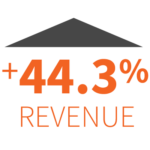Ready to explore the possibilities?
Request a quick call with our team to find out how the Innovation Explorer program can help your business take its next big leap into AI and automation.

Results roundup – what had an impact this month?
We have just two insights to share with you from the latest data. Don’t think for one minute we’re letting you off lightly though – there’s some detail. Make a brew and get comfy. We’ve got:
- A zippy little case study that demonstrates how an SEO and content strategy can make a difference almost immediately.
- A cautionary tale about PPC account mismanagement and how it can impact an entire business.
SEO doesn’t always take 6 months to kick in
SEO requires some degree of patience. It doesn’t happen overnight. It’s a slow but satisfying process that you dig a foundation for, and add to. Forever.
If you want instant results, opt for PPC or Paid Social. For magnificent results that are sustainable, you’ll do both, of course – see the Marketing in Adversity report for why and how.

How long does it take to see results from SEO?
As the headline above suggests, it can take around six months on average. Though, in fact, it depends on many factors, so it’s hard to say.
These factors include:
- Has the client done SEO before?
- How is the website built?
- What’s the size of the budget?
- Competitiveness of sector and keywords
- What the competition is up to
For this client:
- SEO was very new
- Their website was well-built (we did it in 2020)
- Their SEO budget is modest (test and learn style)
And also:
- Their visibility was zero – it couldn’t get any worse
In this month’s report, we were absolutely chuffed to be able to tell the client that our work has:

- Improved rankings strongly
- Which have helped drive a 52.1% increase in sessions
- Which have generated an increase of 44.3% in revenue MoM
All organically. Within three months of starting the SEO retainer.
Other indicators of success
- More than 200 new keywords ranked in June MoM
- 85 low-intent and non-relevant keywords lost MoM
Overcoming the crippling impact of poor Paid Media management
We’re a few months into a Paid Media contract with a new client. It’s going as well as it can.
I know, I know… these roundups are usually brimming with positivity! Rest assured, we’re still feeling chipper and good things have happened.
- The downer of this story is that it highlights an all-too-common issue of the long- lasting damage that can be caused by inadequate PPC management.
- On the upside, as the digital marketing agency that has inherited the PPC management, we’ve put a plan in place that supports its recovery.
What the heck happened?
The sole PPC manager at a business moved on and we were brought in by a new marketing manager to handle the account.
They’re an ambitious national entity with plans to scale. They’d poured a healthy PPC budget into their digital advertising, which was itself a strong tactical element of their marketing strategy.
This failing had rippled, unnoticed, throughout the whole business.
It felt pretty brutal to tell them that the PPC data reporting had been inaccurate for at least the last year. And that this failing had rippled, unnoticed, throughout the whole business.
The bottom line? It was misrepresenting revenue by double-counting leads and incorrectly estimating the value of these leads to the business.
The impact
This means the PPC data from the previous year is unusable – because it’s inaccurate. We can’t use it as a guide or a benchmark.
It raises the questions of:
- How do we know we’re doing a good job if we can’t report on historical performance?
- How can we reassure the client their budget is being used well (or not)?
The implications for the business are wider: the failings on this part of the marketing strategy meant that impact of the whole marketing budget was under question.
Our plan
The business needs confidence in its PPC campaigns to move on. While we can’t use the inaccurate data for historical comparisons, we have put a framework in place to allow them to move forward in this way.
We pride ourselves on being completely transparent… and it’s never more important than in a situation like this.
This includes weekly tracking reports and progress discussions. We pride ourselves on being completely transparent about our activities and in our analysis of data – and it’s never more important than in a situation like this.
We put new tracking via data layers into place too, in order to provide robust conversion and revenue tracking. We also bring in data from other areas of the business to provide comparisons:
- Does sales data match up with accounting data?
- Do the conversions we report on match up with the back-end data?
It’s a laborious, disciplined, detailed process but we’ve got our eyes on the prize. In a few months we’ll have built a more complete picture of what’s going on, and eventually the PPC data will have integrity the business can use to build on. And that’s something to shout about.
Takeaways
- Have patience with your SEO – it always pays off; sometimes sooner, sometimes down the line
- Nobody gets to be an expert without breaking things, but businesses must find ways to protect themselves and their budgets
- Don’t put everything into one pot – spread your marketing budget across quick-wins via Paid Media, as well as slow-burners like SEO and CRO (see our Marketing in Adversity report for more details and data on why)
- If your business is looking to scale and grow, you need good data
Door4 is all about revenue optimisation – success, growth, rinse, repeat. If you’d like to know more about what this could do for you, get in touch.
Photo by Vlad Vasnetsov from pixabay
-
 30.06.2021|Learn how to bid on PPC advert keywords and create ads that convert - and stop wasted ad spend by using best practice or, better still, getting support.
30.06.2021|Learn how to bid on PPC advert keywords and create ads that convert - and stop wasted ad spend by using best practice or, better still, getting support. -
 17.05.2021|What was once a cloak and dagger practice of keyword stuffing, cloaking and PBNs, SEO is now, or should be, an everyday discipline of the modern marketer.
17.05.2021|What was once a cloak and dagger practice of keyword stuffing, cloaking and PBNs, SEO is now, or should be, an everyday discipline of the modern marketer. -
 09.07.2020|How do you optimise website content and SEO strategy to Google’s E-A-T? Learn more about the three pillars, with practical tips and examples.
09.07.2020|How do you optimise website content and SEO strategy to Google’s E-A-T? Learn more about the three pillars, with practical tips and examples.
Door4 opinions and insight.
We have a lot to talk about.Our latest articles, features and ramblings.
We explore performance marketing, AI, communications and optimisation.











